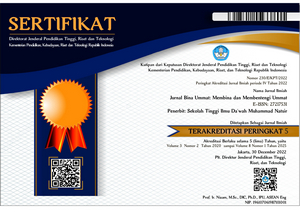DA'WAH STRATEGY IN PREVENTING APOSTASY IN CISANTANA VILLAGE, CIGUGUR DISTRICT, KUNINGAN DISTRICT
DOI:
https://doi.org/10.38214/jurnalbinaummatstidnatsir.v5i2.150Keywords:
Da'wah Strategy, Da'wah Management and Christianization.Abstract
The purpose of this research is to find formulations and methods of da'wah strategies and management that are effective for the community in warding off solicitations or inducements to change to other religions. The method used in this study is descriptive qualitative, with a field observation approach to the problem to be studied. The results of the study found that an effective way to prevent Christianization in the Cisantana village community, Cigugur sub-district, Kuningan district, can be done in various ways; da'wah bil hall or with concrete actions, such as strengthening the people's economy through empowering the Baitul Maal (collecting zakat infaq, grants, and almsgiving), increasing the quality and quantity of Islamic-based education (Islamic boarding schools and other Islamic religious schools), strengthening Islamic ukhuwah among people.
Published
Issue
Section
This work is licensed under a Lisensi Creative Commons Atribusi 4.0 Internasional.
Authors who publish with this journal agree to the following terms:
- Authors retain copyright and grant the journal right of first publication with the work simultaneously licensed under a�Creative Commons Attribution License that allows others to share the work with an acknowledgment of the work's authorship and initial publication in this journal.
- Authors are able to enter into separate, additional contractual arrangements for the non-exclusive distribution of the journal's published version of the work (e.g., post it to an institutional repository or publish it in a book), with an acknowledgment of its initial publication in this journal.
- Authors are permitted and encouraged to post their work online (e.g., in institutional repositories or on their website) prior to and during the submission process, as it can lead to productive exchanges, as well as earlier and greater citation of published work (See�The Effect of Open Access).




